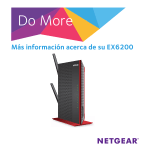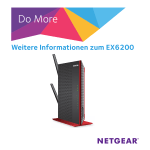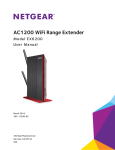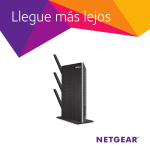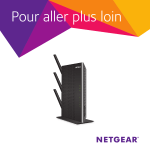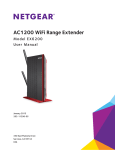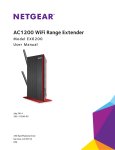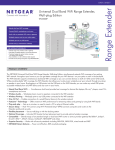Download Netgear EX6200 Owner's Manual
Transcript
Do More Learn more about your EX6200 Contents Experience Next-Generation WiFi . . . . . . . . . . . . . . . . . . . . . . . . . . . . . . . . . . 3 Optimize Your WiFi . . . . . . . . . . . . . . . . . . . . . . . . . . . . . . . . . . . . . . . . . . . . . . . 4 Share Files Across Your Network . . . . . . . . . . . . . . . . . . . . . . . . . . . . . . . . . . . 5 Boost Your Video Streaming . . . . . . . . . . . . . . . . . . . . . . . . . . . . . . . . . . . . . . . 7 Connect Ethernet-Enabled Devices . . . . . . . . . . . . . . . . . . . . . . . . . . . . . . . . . 9 Connect a Printer . . . . . . . . . . . . . . . . . . . . . . . . . . . . . . . . . . . . . . . . . . . . . . . . 10 Change Your Settings . . . . . . . . . . . . . . . . . . . . . . . . . . . . . . . . . . . . . . . . . . . . 13 FAQ . . . . . . . . . . . . . . . . . . . . . . . . . . . . . . . . . . . . . . . . . . . . . . . . . . . . . . . . . . . . 14 2 Experience Next-Generation WiFi Your new WiFi extender supports the 802.11ac networking standard. This new standard offers better speed, improved reliability, and more range than older WiFi networking standards. Your extender is backward compatible with prior WiFi standards. However, to get the benefits of 802.11ac, your router must support the 802.11ac WiFi networking standard. To learn more about the 802.11ac WiFi networking standard, visit http://www.netgear.com/landing/80211ac/. 3 Optimize Your WiFi The NETGEAR WiFi Analytics app provides detailed information to help you optimize your WiFi home network. To install the app, visit the Google Play store or scan the QR code. The WiFi Analytics app provides the following: • • • Network status. Get an overview of all available WiFi networks, including signal strength, channel, security protocol, MAC address, and more. Channel interference. Identify crowded and clear WiFi channels and get channel connection recommendations. Signal strength. Determine the data rate available in various locations in your home. 4 Share Files Across Your Network You can share data that is stored on most common USB storage devices across your network with ReadySHARE® USB Storage Access. USB 3.0 port To access a USB device from a Windows computer: 1. Insert your USB storage device into the USB 3.0 port on the extender. 2. Select Start > Run. 3. Enter \\readyshare in the dialog box. 4. Click the OK button. 5 To access a USB device from a Mac: 1. Insert your USB storage drive into the USB 3.0 port on the extender. 2. In Finder, select Go > Connect to Server. 3. In the Server Address field, type smb://readyshare as the server address. 4. Click the Connect button. To change the ReadySHARE folder name on the extender: If you have a NETGEAR router that supports ReadySHARE, the router’s default ReadySHARE folder name is \\readyshare. The extender’s default ReadySHARE folder name is also \\readyshare. You can change the extender’s default ReadySHARE folder name so that you can tell the folders apart. 1. Open a browser on your laptop, tablet, or smartphone and visit www.mywifiext.net. 2. Log in using the following credentials: • User name. admin • Password. password 3. Select USB Storage > Advanced Settings. The USB Storage (Advanced Settings) screen displays. 6 4. In the Network/Device Name field, type a new name. Note: After you change the network/device name, the folder name also changes. 5. Click on the Apply button. Your changes are saved. Boost Your Video Streaming Get the most out of your HD entertainment with FastLane™ Technology. FastLane Technology connects to your router using one band and connects to your devices using another band. Because a band is dedicated to each function, performance is enhanced. To activate FastLane mode: 1. Connect to the extender’s WiFi network. 2. Open a browser on your laptop, tablet, or smartphone and visit www.mywifiext.net. 3. Log in using the following credentials: • User name. admin • Password. password If you changed the default password, enter the password you created. 7 4. Select Advanced > Operating Mode. The Operating Mode screen displays. 5. Select the FastLane Technology radio button. 6. Review the two FastLane Technology options and choose the band–either 2.4 GHz or 5 GHz–that is compatible with most of your devices. If you are not sure which band your devices use, check your user manuals or search the Internet. 7. Click the Apply button. Your changes are saved. 8 Connect Ethernet-Enabled Devices You can use your extender to wirelessly connect as many as five Ethernet-enabled devices, such as smart TVs, game consoles, and Blu-ray players, to your WiFi router or access point at gigabit speeds. After your set up your extender, plug the Ethernet cable from a device directly into the extender’s gigabit Ethernet port. Ethernet ports 9 Connect a Printer To connect a printer to your extender and enjoy wireless printing from your laptop and other devices, use your extender’s ReadySHARE Printer feature. To set up your printer: 1. See if your computer already has the printer driver software installed. A printer driver is the software that enables your computer to communicate with your printer. If your computer has printer driver software installed, go to Step 2. If your computer does not have printer driver software already installed, follow these steps: a. Locate the printer driver software for your computer. It usually comes on a CD in the box with your printer. You can also download the latest software from your printer manufacturer’s website. b. Insert the CD or launch the download. The driver guides you through the installation. 10 2. Connect your printer’s USB cable to the extender’s USB port. USB 3.0 port 3. Visit www.netgear.com/readyshare and download the ReadySHARE Printer utility for Windows or Mac. 4. Install the ReadySHARE Printer utility. After you install it, the utility displays as NETGEAR USB Control Center on your computer. 5. Launch the NETGEAR USB Control Center. A list of available printers displays. If this is the first time you are running the utility, you are asked to select a default printer. 6. Select a printer and click the Connect button. Whenever you want to print, open the NETGEAR USB Control Center and make sure your printer status says available. To print from other devices, repeat this setup process for each of them. 11 If you have problems printing, follow these troubleshooting tips: • • • Some firewall software blocks the ReadySHARE Print utility from accessing the printer. If you do not see the printer listed in the NETGEAR USB Control Center utility, disable the firewall temporarily to allow the utility to work. The NETGEAR USB Control Center utility must be running in the background for printer sharing to work. If you exit the utility, you cannot access the printer on your WiFi network. If the printer status is manually connected or otherwise unavailable, it means the printer is in use. It becomes available after the current job is finished or the connection times out. The default time-out is 30 seconds. You can change the default time-out setting in the NETGEAR USB Control Center by selecting Tools > Configuration. 12 Change Your Settings To change your password or other settings: 1. Connect to the extender’s WiFi network. 2. Open a browser on your laptop, tablet, or smartphone and visit www.mywifiext.net. 3. Log in using the following credentials: • User name. admin • Password. password If you changed the default password, enter the password you created. 4. Make any needed changes. 13 FAQ Here is where you can find answers for difficulties you might experience. NETGEAR genie keeps asking me for my WiFi password and I am sure I entered the correct password. What can I do? It is likely that your extender is placed at the borderline of the signal range covered by your main WiFi router. To improve your signal strength, move your extender closer to your router and make sure that the 2.4 GHz or 5 GHz Link Rate LED lights solid amber or green. Best Connection Good Connection Poor Connection No Connection Will the extender work if I connect it to my main WiFi router with an Ethernet cable? No, your extender is designed only to connect wirelessly to the router. 14 My router security is WEP, and I entered the wrong passphrase or security key on the extender. I cannot access the extender anymore. What can I do? The extender cannot check to see if the WEP passphrase is correct. If you entered the wrong passphrase, your wireless device is not able to get the IP address from the extender. You must reset the extender to the factory defaults to get the IP address back. I am connected to NETGEAR_EXT and launched a browser. Why am I unable to see NETGEAR genie? Try these troubleshooting steps: • • • Make sure that your computer is set up to use DHCP (most are). Make sure that the Client Link LED is green and that you have a valid IP address. Relaunch the web browser and type www.mywifiext.net or www.mywifiext.com in the address field of the web browser. Enter admin for the user name and password for the password. 15 What are the default user name and password to log in to the extender? If you are online at http://www.mywifiext.net, you can use the following to log in: • • User name. admin Password. password I completed the NETGEAR genie smart setup, but my wireless devices cannot get the IP address from the extender. What should I do? Make sure that the passphrase you entered on your wireless device is correct, and power cycle the extender and your router. If your device is still not able to get the IP address, try these tips: • • • Move the extender closer to your router and move your wireless device closer to the extender. Disable the wireless interface and enable it again to see if your wireless device can get the IP address. If your router has a MAC filter, wireless access control, or access list, follow the instructions on page 17. 16 I enabled a wireless MAC filter, wireless access control, or access control list (ACL) on my router. What should I do when installing the extender? When the WiFi device connects through the extender to your router, the MAC address of the WiFi device shown on the router is translated to another MAC address. If your router's MAC filter, wireless access control, or ACL is enabled, the WiFi device connects to the extender but cannot get an IP address from the extender and cannot access the Internet. To allow the WiFi device to receive an IP address from the extender and access the Internet, you must provide the translated MAC address to the router. To add a translated MAC address to your router: 1. Log in to your router and disable the MAC filter, wireless access control, or ACL. For more information on how to disable your router’s MAC filter, wireless access control, or ACL, see your router’s documentation. 2. Power on the extender and connect all of your WiFi devices to the extender. 3. Make sure that the Link Rate LED remains lit. 17 4. Log in to your extender. a. Launch a web browser and in the address field, enter www.mywifiext.net or www.mywifiext.com. A login screen displays. b. Enter admin for the user name and password for the password. 5. Select Maintenance > Attached Devices. The Attached Devices screen displays the MAC addresses and virtual MAC addresses for computers and WiFi devices that are connected to the extender network. 6. On the router, add all of the virtual MAC addresses from your extender to your router’s MAC filter table. 7. Pull out the product label from the extender and find the extender’s MAC 1 and MAC 2 addresses. 8. Add the extender’s MAC 1 address to your router’s MAC filter table. 9. Add the extender’s MAC 2 address to your router’s MAC filter table. You must type 02:0F:B5: first, then type the last six digits of your MAC 2 address after. For example, if your MAC 2 address is C4:04:15:5F:20:AC, type 02:0F:B5:5F:20:AC in your router’s MAC filter table. 18 10. Convert the extender’s MAC 1 address and add the new MAC 1 address to your router’s MAC filter table. For more information, see the user manual. a. Convert the first two hexadecimal values in the extender’s MAC 1 address to binary. See the user manual for the conversion table. b. Toggle the second to last digit of the binary code to one or zero. If the second to last digit is one, toggle it to zero. If the second to last digit is zero, toggle it to one. c. Convert the new binary code back to a hexadecimal value. See the user manual for the conversion table. d. Replace the first two hexadecimal values in the old MAC 1 address with the new value you converted and add the new MAC 1 address to your router’s MAC filter table. For example, if your old MAC 1 address was C4:04:15:5F:20:AD, your new MAC 1 address is C6:04:15:5F:20:AD. 11. Enable the router’s MAC filter, wireless access control, or ACL. 19 Technical Support Thank you for purchasing this NETGEAR product. After installing your device, locate the serial number on the label of your product and use it to register your product at https://my.netgear.com. You must register your product before you can use NETGEAR telephone support. NETGEAR recommends registering your product through the NETGEAR website. For product updates and web support, visit http://support.netgear.com. NETGEAR recommends that you use only the official NETGEAR support resources. You can get the user manual online at http://downloadcenter.netgear.com or through a link in the product’s user interface. Trademarks NETGEAR, the NETGEAR logo, and Connect with Innovation are trademarks and/or registered trademarks of NETGEAR, Inc. and/or its subsidiaries in the United States and/ or other countries. Information is subject to change without notice. © NETGEAR, Inc. All rights reserved. Compliance For the current EU Declaration of Conformity, visit http://support.netgear.com/app/answers/detail/a_id/11621/. For regulatory compliance information, visit http://www.netgear.com/about/regulatory/. See the regulatory compliance document before connecting the power supply. NETGEAR, Inc. 350 East Plumeria Drive San Jose, CA 95134, USA July 2014





















